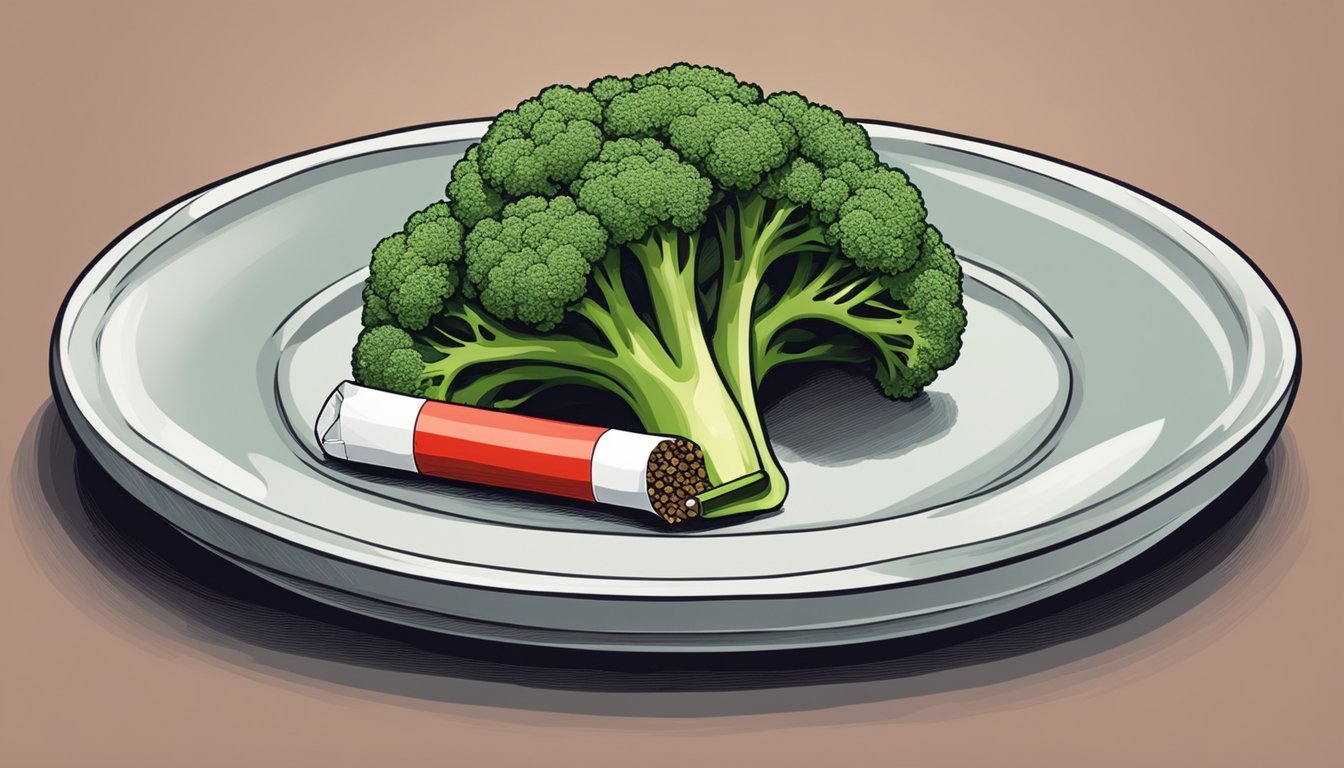Crave-Busting Bites: Foods That Help You Quit Smoking for Good
Quitting smoking is one of the most challenging endeavors individuals can undertake. The journey to becoming smoke-free often involves managing cravings and withdrawal symptoms. Interestingly, certain foods can play a supportive role in this process.
Incorporating specific foods into one's diet can help reduce nicotine cravings and mitigate withdrawal symptoms, thus aiding the transition to a smoke-free life. Understanding which foods to include can make a significant difference in the success of quitting smoking, offering a natural way to support overall well-being during this challenging time.
1) Carrots
Carrots can be a valuable ally in the quest to quit smoking. Their crunchy texture makes them an excellent substitute for the oral fixation many smokers experience.
Raw carrots are easily accessible and require no preparation, making them a convenient option for those in search of a quick snack.
In addition to aiding smoking cessation, carrots are rich in vitamins and minerals. This nutritional boost can be beneficial as the body recovers from the effects of nicotine.
Carrots also leave a slightly bitter aftertaste, which some smokers find discourages them from lighting up. This can be particularly effective following a meal.
Their low calorie content means that carrots can be consumed freely without concern for weight gain, a common worry among those quitting smoking.
Consuming carrots as part of a balanced diet can support overall health and well-being, reinforcing the strides made in quitting smoking.
2) Baby Spinach
Baby spinach is a versatile and nutritious leafy green that can help those trying to quit smoking. It's packed with vitamins and minerals essential for overall health.
Rich in Vitamin C, baby spinach helps replenish this nutrient, which is often depleted in smokers. This can aid in reducing stress and anxiety, common withdrawal symptoms.
The folate in baby spinach is beneficial for brain health. This can improve mood and cognitive function, making the quitting process a bit more manageable.
Incorporating baby spinach into meals is easy. It can be added to salads, smoothies, or cooked dishes, providing a simple way to boost nutrient intake.
Given its low calorie count and high fiber content, baby spinach also promotes a feeling of fullness, which can help manage weight—a concern for many who quit smoking.
3) Cherry Tomatoes
Cherry tomatoes are small, juicy, and rich in vital nutrients. They are a great snack option for those trying to quit smoking.
Packed with antioxidants, especially vitamin C, cherry tomatoes help repair damage caused by smoking. This nutrient aids in the body’s recovery by combating oxidative stress.
The natural sweetness of cherry tomatoes can satisfy cravings for sugary snacks. This makes them a healthier alternative that supports a balanced diet.
Eating cherry tomatoes can help keep hands busy and reduce the need to hold cigarettes. This can be particularly useful in breaking the habit.
Incorporating cherry tomatoes into salads, snacks, or meals is simple. They add flavor and nutrients while supporting the quitting process.
4) Whole Grain Bread
Whole grain bread can be a beneficial food for those looking to quit smoking. The complex carbohydrates in whole grain bread provide sustained energy. This can help stabilize blood sugar levels that may fluctuate during nicotine withdrawal.
Eating whole grain bread can help maintain a feeling of fullness. This reduces the urge to snack on less healthy options during cravings.
Fiber-rich whole grain bread supports digestive health and can aid in preventing constipation, which sometimes occurs when quitting smoking.
Additionally, whole grain bread contains important nutrients like B vitamins and minerals. These nutrients support the body's overall health and can help during the recovery process from smoking.
Replacing refined grains with whole grain bread can contribute to a balanced diet. This can positively impact both physical and mental well-being while quitting smoking.
5) Oatmeal
Oatmeal is a versatile and nutritious food that can support those trying to quit smoking. High in soluble fiber, oatmeal helps to keep the body feeling full for longer periods. This can be particularly helpful in reducing nicotine cravings which are often triggered by hunger.
Consuming oatmeal can also stabilize blood sugar levels, contributing to an overall sense of well-being. This stable energy can assist in managing the stress and irritability that often accompany the quitting process. Additionally, the slow release of energy from oatmeal avoids the peaks and troughs in blood glucose that can trigger cravings.
Oatmeal is also rich in vitamins and minerals, such as magnesium and iron, which support overall health. Preparing oatmeal with a variety of fruits, nuts, and seeds can further enhance its nutritional profile. This combination provides a satisfying and balanced meal option.
Regular inclusion of oatmeal in the diet can be an easy and beneficial strategy for those aiming to quit smoking. Its nutritional benefits and ability to stave off hunger can make it a valuable part of a smoke-free lifestyle.
6) Broccoli
Broccoli is a potent ally for those looking to quit smoking. Rich in vitamins C and B5, it helps replenish nutrients lost due to nicotine consumption. These vitamins support the body’s overall function and aid in detoxification processes.
Broccoli's high fiber content can contribute to reducing nicotine cravings. Fiber supports digestive health, which can be disrupted by quitting smoking, and provides a sense of fullness that can curb cravings.
The natural compounds in broccoli, including sulforaphane, assist in the body's defense against potential damage from smoking-related toxins. These compounds help neutralize carcinogens, promoting healthier bodily functions.
Including broccoli in your diet can be as simple as adding it to salads, stir-fries, or enjoying it steamed. This green vegetable's multiple benefits make it an excellent choice for anyone aiming to quit smoking.
7) Berries
Berries are highly beneficial for individuals looking to quit smoking. They are rich in vitamins, antioxidants, and fiber, which can assist in cleansing the body of toxins.
Strawberries, blueberries, and raspberries can help neutralize free radicals and repair some of the damage caused by nicotine.
The high vitamin C content in berries can help replenish the vitamin C levels often depleted by smoking. This can boost the immune system and improve overall health.
Berries also offer natural sweetness, which can help reduce the urge for a cigarette. Their satisfying taste can be a welcome replacement for the craving often associated with nicotine withdrawal.
Incorporating berries into daily meals or snacks provides a healthy option that not only supports the body's detoxification but also helps manage stress. They are easy to add to various dishes, making them a versatile choice for those on the path to quitting smoking.
8) Almonds
Almonds are a nutritious snack that can aid those looking to quit smoking. Rich in protein, fiber, and healthy fats, they help keep hunger at bay and provide lasting energy.
The act of eating almonds can also serve as a distraction from the urge to smoke. Their crunchiness satisfies the oral fixation that many former smokers struggle with.
Consuming almonds may also contribute to overall better mood and reduced stress levels. They contain vitamins and minerals essential for brain health, such as magnesium and vitamin E.
Almonds are easy to incorporate into a daily diet. They can be eaten on their own, added to salads, or mixed with yogurt, offering versatility while supporting the cessation journey.
Including almonds as part of a balanced diet may help mitigate weight gain often associated with quitting smoking. Their satiating properties can reduce the likelihood of reaching for unhealthy snacks.
Overall, almonds provide a practical, healthful option for those committed to quitting smoking, addressing both nutritional and psychological needs in the process.
9) Dark Chocolate (70% cacao or higher)
Dark chocolate with a cacao content of 70% or higher offers several benefits for those trying to quit smoking. The rich flavor can satisfy cravings and provide a sense of indulgence without turning to cigarettes.
This type of chocolate contains compounds that can elevate mood. Consuming dark chocolate can lead to improved mood due to its positive effect on the gut microbiome, which can contribute to better emotional health.
Dark chocolate also contains a small amount of caffeine, which is much less than coffee. This can provide a mild energy boost, helping to combat the fatigue that sometimes accompanies nicotine withdrawal.
A quarter cup of dark chocolate (1.5 ounces or 2 large squares) contains around 220 calories, 2 grams of protein, and 13 grams of fat. It is a good option for a fulfilling and satisfying snack.
To maximize benefits, choose dark chocolate with a higher cacao content, such as 85%, which has been shown to improve mood more effectively than lower percentages. Moderation is key, and incorporating dark chocolate as part of a balanced diet can be an enjoyable way to support the quit-smoking journey.
10) Green Tea
Green tea is a beneficial addition to a diet for those looking to quit smoking. It contains antioxidants that can help repair some of the damage caused by smoking.
This beverage is known for its anti-inflammatory properties, which aid in reducing inflammation in the lungs.
Green tea can also play a role in helping the body detox from nicotine and other harmful chemicals found in cigarettes. By drinking green tea regularly, individuals may support their body's natural detoxification processes.
Additionally, the ritual of drinking tea can serve as a healthy replacement for the habit of smoking. Replacing the act of smoking with drinking tea can help satisfy the hand-to-mouth action associated with smoking.
Incorporating green tea into a daily routine can provide a calming effect, which is beneficial for managing stress, a common trigger for smoking. The calming properties of green tea may assist in maintaining a sense of relaxation and focus.
Regular consumption of green tea can contribute to overall lung health during the smoking cessation process. This makes it a valuable component of any plan designed to help quit smoking.
The Role of Nutrition in Smoking Cessation
Effective nutrition strategies can significantly support individuals in managing withdrawal symptoms and reducing nicotine cravings. Focusing on a balanced diet and specific food choices can lead to better outcomes in the journey towards quitting smoking.
Impact of a Balanced Diet
A balanced diet is crucial for those trying to quit smoking. Proper nutrition helps in maintaining energy levels and enhancing mood. Fruits and vegetables are particularly beneficial. They provide essential vitamins and minerals which promote overall health, aiding the body's recovery from the damage caused by smoking.
Including whole grains, lean proteins, and healthy fats in daily meals can stabilize blood sugar levels. This helps in mitigating mood swings and irritability that often accompany nicotine withdrawal. Effective hydration is also key, as it aids in flushing out nicotine from the body.
How Certain Foods Affect Nicotine Cravings
Certain foods can influence nicotine cravings. For instance, fresh fruits like apples, berries, and oranges can help reduce the intensity of cravings. Their natural sugars provide a healthy alternative to the sweetness that smokers often miss when they quit.
Vegetables like carrot sticks and celery may create a bitter taste if consumed before smoking, which can discourage the act. Foods rich in fiber and protein can extend feelings of fullness, curbing the urge to smoke as a way to manage hunger.
Moreover, some studies suggest that dairy products make the taste of cigarettes less appealing. Thus, incorporating yogurt or milk in meals can be beneficial. Avoiding stimulants like caffeine can also help, as it may increase anxiety and restlessness, leading to a higher urge to smoke.
Foods That Support Quitting Smoking
Certain foods can assist individuals in their journey to quit smoking by reducing cravings, detoxifying the body, and improving mood. Key areas to focus on include vitamins and minerals that offer specific benefits and hydration for detoxification.
Vitamins and Minerals
Incorporating Vitamin C-rich foods like oranges, strawberries, and bell peppers can combat nicotine withdrawal symptoms. Vitamin C helps to flush nicotine out of the system and repair tissues.
Vitamin B plays a crucial role in mood regulation and stress relief. Foods like bananas, beans, and whole grains are good sources of Vitamin B and can alleviate anxiety associated with quitting smoking.
Magnesium aids in relaxation and can be found in leafy greens, nuts, and seeds. This mineral helps mitigate stress and irritability during the quitting process.
Hydration and Detoxification
Staying well-hydrated is essential for detoxifying the body from nicotine. Drinking plenty of water helps to flush out toxins and keep the body in balance.
Herbal teas, such as chamomile and green tea, provide not only hydration but also antioxidants that assist in the detoxification process. They also offer a comforting routine for those dealing with the habit of smoking.
Including water-rich fruits and vegetables like cucumbers, watermelon, and celery in the diet can boost hydration and provide essential nutrients. These foods are low in calories and can also help manage weight gain concerns often associated with quitting smoking.
Long-Term Dietary Strategies
Long-term dietary strategies can support individuals in maintaining a healthy weight post-cessation and developing sustainable eating habits to aid in their journey to quit smoking.
Maintaining a Healthy Weight Post-Cessation
Weight gain can be a concern when quitting smoking, especially for women. To mitigate this, a balanced diet rich in fruits, vegetables, lean proteins, and whole grains is essential.
Regular Meals: Establishing a routine with regular meals helps stabilize metabolism.
Healthy Snacks: Replace high-calorie snacks with options like apple slices, carrot sticks, or cucumber. These not only help in reducing cravings but also provide essential nutrients.
Physical Activity: Incorporating physical training into daily routines can burn extra calories and counteract weight gain. Activities like walking, cycling, or swimming are effective.
Hydration: Drinking water can reduce the urge to snack unnecessarily and helps detoxify the body.
Building Sustainable Eating Habits
Developing sustainable eating habits is crucial for long-term success.
Whole Foods: Focus on incorporating whole foods such as fruits, vegetables, nuts, and seeds. These provide essential vitamins and minerals needed for overall health.
Meal Planning: Planning meals ahead of time ensures that individuals make healthier food choices and avoid impulsive eating.
Avoiding Triggers: Identify and avoid foods or beverages that trigger the urge to smoke, such as coffee or alcohol. Substitute with herbal teas or different types of water.
Mindful Eating: Practice mindful eating to better understand hunger cues and prevent overeating.
Support Networks: Engaging with support groups or a dietitian can provide guidance and encouragement throughout the journey.









